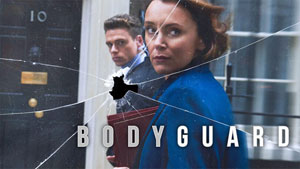“Bodyguard” (2018, BBC and Netflix), the six-episode British suspense series, starts with police sergeant David Budd (Richard Madden) trying to talk down a terrorist bomber on a train and mostly maintains that level of intensity throughout its run, but in a different way than its obvious point of comparison, “24.” The teeth-chattering suspense sequences are strong, but what makes “Bodyguard” stand out is its intricate plotting. Budd might not be in peril 24/7 like Jack Bauer, but there’s always something sinister going on that at least tangentially relates to him.
Written by British TV veteran Jed Mercurio, “Bodyguard” digs into the weeds of how Budd does his bodyguard job for Home Secretary Julia Montague (Keeley Hawes). He’s tasked with protecting her, yet she’s initially cold to him, like he’s a tool or accessory. But we see enough of his off-duty life – including with ex-wife Vicky (Sophie Rundle) and their two young kids – to know he’s a human being.
He has the most intimate of jobs in Julia’s circle, but he’s on the outside; in several scenes, he stands outside her glass-walled office while she briefs security-state personnel. We’re privy to dialog Budd can’t hear, but because security-state maneuvers and political gamesmanship are complicated anyway, we’re still right there with him.
“24” pays lip service to issues such as corrupt government officials or a corrupt system, period, and the moral gray area Bauer finds himself in. With “Bodyguard,” a viewer gets a sense that Budd is actually thinking about these issues in the “downtime” – if you will — between action sequences or clue-gathering. He doesn’t verbalize his thoughts, but we know the gears are turning as he listens to his facially scarred military buddy Andy (Tom Brooke) rail against the politicians who sent them to war, and then to Julia’s speeches where she defends the warfare state.
“Bodyguard” plays out against the backdrop of the government spying debate, as Julia is pushing the latest “Snoopers’ Charter” and seeking party support in a country where the populace rejects it. Meanwhile, we see the police and homeland security making good use of the snooping powers they do possess, and other examples where they arguably could’ve used more power. It takes them a surprisingly long time to make certain connections (although in the end we find out alternative explanations for this).
After a solid but slow start, the show becomes engrossing starting with the third episode as we and Budd begin to get caught in an almost 1970s-paranoia-film level of intrigue, including a scene where our hero meets with a contact in a brick alley in the rain. The kompromat (a tablet containing files damaging to the villains) functions as a maguffin, like “24’s” nuclear football, sure, but what’s on the tablet are also examples of the detailed nature of this web of intrigue. “Bodyguard” gets slightly overblown at times and slightly convenient at times, but it doesn’t stray beyond the range where we believe these events could play out in a modern Western government.

Although Budd is unquestionably the main character, the depth of the cast around him is good, too. Interesting turns come from Gina McKee as a squinty-eyed homeland security leader, “The Terror’s” Paul Ready as a sniveling assistant to Julia, Vincent Franklin as a veteran official who wants inter-agency cooperation, and Ash Tanden as a by-the-book officer suspicious of Budd.
“24” fans might particularly note that Budd has similar, and similarly underdeveloped, family troubles to those of Jack. “Bodyguard” illustrates the incompatibility of being both a family man and a soldier or marshal. There for David at times, absent at others, Vicky is unfortunately another agent of chaos in the life of a man thrown into a chaotic web, sometimes with the tools of his trade turned against him. Seeing what it takes to win back his family, even Jack might be stunned.

